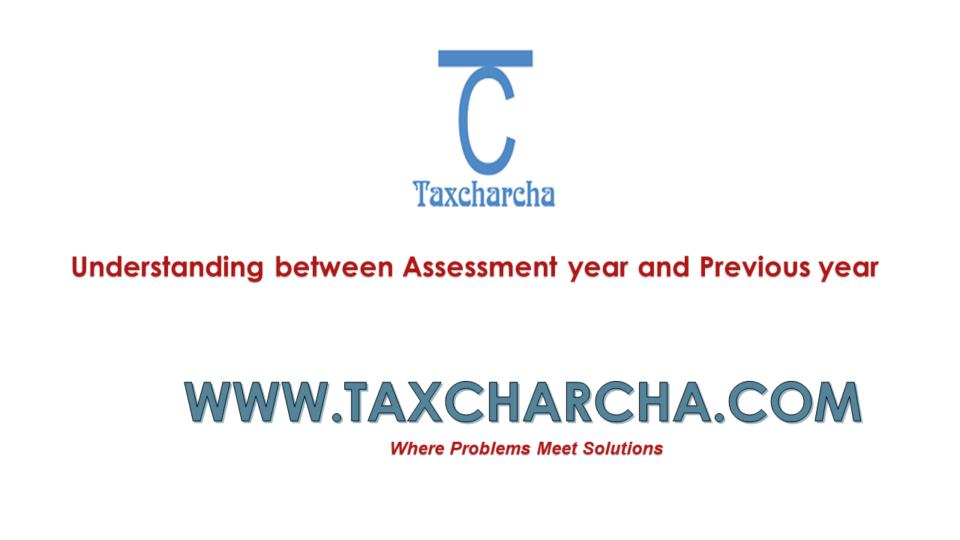Previous Year (PY):
The Previous Year refers to the financial year immediately preceding the Assessment Year. It is the year in which the taxpayer earns income and is assessed for tax purposes. In simpler terms, it’s the year in which the income is earned, and it serves as the basis for computing tax liabilities for the subsequent Assessment Year.
For example, if the Previous Year is 2023-24, it means that the income earned by the taxpayer during the financial year from April 1, 2023, to March 31, 2024, will be considered for assessment in the Assessment Year 2024-25.
Assessment Year (AY):
The Assessment Year is the year in which the income earned during the Previous Year is assessed and taxed. It follows the Previous Year. During the Assessment Year, taxpayers file their income tax returns declaring their income earned during the Previous Year and pay taxes accordingly.
Continuing from the example above, if the Previous Year is 2023-24, then the Assessment Year would be 2024-25. It’s in the Assessment Year that taxpayers file their tax returns for the income earned in the Previous Year.
Significance:
Understanding the distinction between the Previous Year and the Assessment Year is crucial for tax planning and compliance. Taxpayers need to keep track of their income earned during the Previous Year to ensure accurate reporting and payment of taxes in the subsequent Assessment Year.
Key Points:
- Financial Year (FY): In India, the financial year runs from April 1st to March 31st. The income earned during this period constitutes the Previous Year for tax purposes.
- Tax Filing Deadline: Taxpayers must file their income tax returns for a particular Previous Year within the Assessment Year by the due date specified by the Income Tax Department.
- Tax Planning: Understanding the concept of Previous Year and Assessment Year allows taxpayers to engage in tax planning strategies to minimize tax liabilities legally.
- Documentation: Maintaining accurate financial records for the Previous Year is essential for smooth tax filing and compliance during the Assessment Year.
In essence, the Previous Year and Assessment Year are fundamental concepts in Indian income tax laws that dictate when income is earned and when it is taxed, respectively. Adhering to these timelines and understanding their implications is crucial for taxpayers to fulfill their tax obligations effectively.
In Indian income tax law, while the general rule is that the Assessment Year follows the Previous Year, there are a few exceptions and special provisions outlined in the Income Tax Act, 1961. Here are some notable exceptions:
- Business Income of Newly Established Business: In the case of a newly established business, the Income Tax Act provides for a specific treatment regarding the Previous Year and Assessment Year. The first Previous Year of such a business is determined based on the date of commencement of its business operations. Consequently, the Assessment Year for such businesses may differ from the general rule.
- Income of Persons Leaving India Permanently: Individuals who are leaving India permanently are subject to special provisions regarding the Previous Year and Assessment Year. In such cases, the period from the beginning of the Previous Year up to the date of departure from India is considered as the Previous Year for tax purposes. The Assessment Year follows the general rule.
- Change in Accounting Year: If there is a change in the accounting year of a taxpayer, the Income Tax Act provides for specific provisions to determine the Previous Year and Assessment Year. In such cases, the income for the period preceding the change in the accounting year is treated as the income of the Previous Year, and the subsequent period constitutes the income of the following Previous Year.
- Amalgamation or Succession of Business: In cases of amalgamation or succession of a business, special provisions are applicable for determining the Previous Year and Assessment Year. The Income Tax Act provides guidelines for the treatment of income and taxes in such scenarios, ensuring a smooth transition and compliance with tax laws.
- Specific Provisions for Certain Incomes or Entities: Certain specific provisions may apply to certain types of incomes or entities, which may result in deviations from the general rule regarding the Previous Year and Assessment Year. For example, special provisions may exist for income from capital gains, income of cooperative societies, income of charitable trusts, etc.
These exceptions and special provisions underscore the complexity of income tax laws and the need for careful consideration of specific circumstances while determining the Previous Year and Assessment Year for tax purposes. Taxpayers are advised to consult tax professionals or refer to the Income Tax Act for detailed guidance in such matters.

